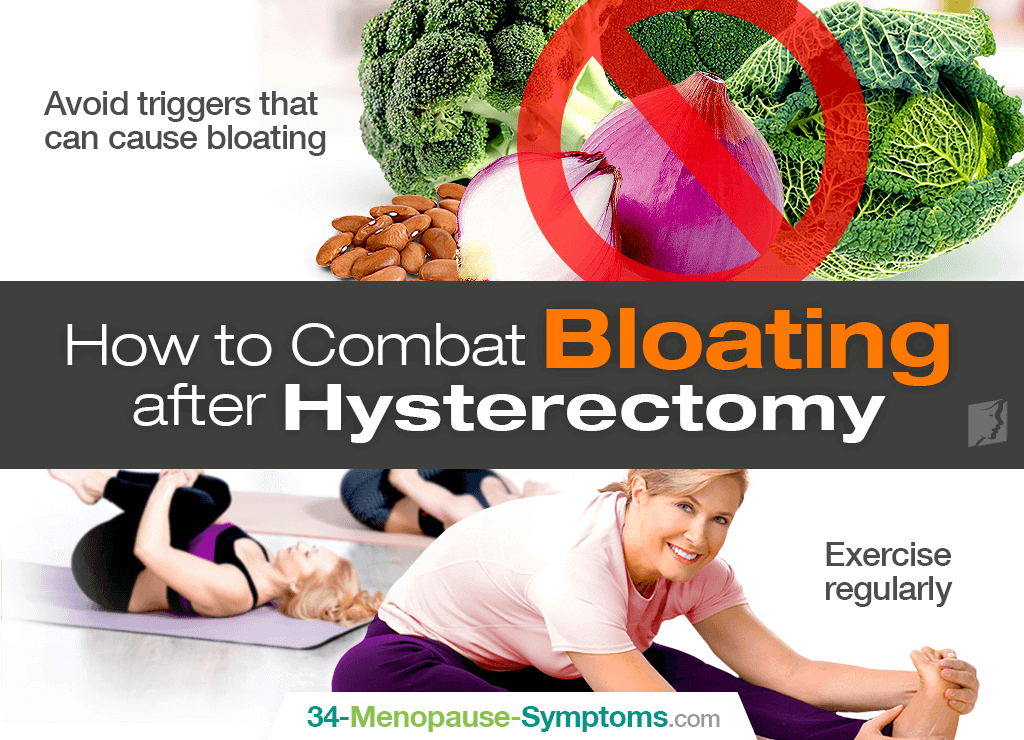Every year, thousands of women undergo a hysterectomy, a surgery to remove all or part of the uterus, and can experience unpleasant side effects as a result, including abdominal bloating. Read on to find out more about bloating after a hysterectomy and why it occurs.
What Is a Hysterectomy?
There are four main types of hysterectomy, and the specific one chosen will depend on the reasons for having the hysterectomy and the woman's medical record. In general, doctors will try and remove as little of the uterus as possible to solve the problem at hand. The four types are:
Total hysterectomy
The womb and cervix are removed. This is the most common type.
Subtotal hysterectomy
Only the womb is removed and the cervix is left in place. Some women opt for this because they need stimulation in the cervix to feel satisfied during sex.
Total with bilateral salpingo-oophorectomy
The womb, cervix, fallopian tubes, and ovaries are all removed.
Radical hysterectomy
This is the least common type, and performed only under extreme circumstances, such as targeting aggressive cancer. Parts removed are the womb, fallopian tubes, part of the vagina, ovaries, lymph glands, and fatty tissue.
Bloating After Hysterectomy
Because a hysterectomy will bring on surgical menopause, the body has had no time to adjust to the sudden drop in estrogen levels. This means that common menopause symptoms, like abdominal bloating, can occur suddenly and severely.
Bloating is a tight or full feeling in the abdomen, and sometimes, the abdominal area can be visibly larger. This is usually due to water retention or increased intestinal gas, and can be worsened by hormone fluctuations. Common symptoms are:
- A feeling of fullness in the abdominal area
- Tight feelings around the stomach
- Swelling of the abdomen
- Increased flatulence
- Increased burping
How to Combat Bloating After Hysterectomy
Although hormones are a primary cause for bloating, there are certain lifestyle habits that can worsen it. Therefore, making small changes to your everyday routine will mean you can drastically reduce instances of bloating after hysterectomy.
Change what you eat
There are certain foods that are known to cause bloating in many people, so these are best avoided. Common triggers are beans, broccoli, onions, and cabbage, but each individual might also have her own personal triggers. It could also be useful to cut out milk and dairy products, as many people have develop lactose intolerance later in life, but are not aware of it.
Exercise regularly
Regular exercise can release much of the gas buildup that leads to abdominal bloating. It also encourages blood to flow to the digestive system, thereby stimulating it to work more efficiently. If food is sitting in the body undigested for too long, it can release gases. Also, there are some specific exercises that help relieve bloating.
Abdominal bloating after a hysterectomy is not uncommon, but is nevertheless distressing, often leaving women feeling uncomfortable and lethargic. In order to reduce the chances of developing abdominal bloating, it is best to make a few changes to your lifestyle habits, such as those mentioned above, and the recovery period should be a lot more comfortable.
Sources
- Brigham and Women's Hospital. (2012). Gas: Beat The Bloat. Retrieved November 5, 2014, from http://www.brighamandwomens.org/Patients_Visitors/pcs/nutrition/services/healtheweightforwomen/special_topics/intelihealth0504.aspx
- Johns Hopkins Medicine. (n.d.). Procedure overview: What is a hysterectomy? Retrieved October 22, 2014, from http://www.hopkinsmedicine.org/healthlibrary/test_procedures/gynecology/hysterectomy_procedure_92,P07777/
- Lee, J.R. (1996). What Your Doctor May Not Tell You About Menopause. New York: Warner Books.
- National Health Service UK. (2014). Beat the Bloat. Retrieved November 5, 2014, from http://www.nhs.uk/Livewell/digestive-health/Pages/beat-the-bloat.aspx
- National Health Service UK. (2014). Hysterectomy. Retrieved October 22, 2014, from http://www.nhs.uk/Conditions/Hysterectomy/Pages/Introduction.aspx
- National Institutes of Health. (2014). Gas - flatulence. Retrieved November 5, 2014, from http://www.nlm.nih.gov/medlineplus/ency/article/003124.htm
- Northrup, C. (2006). The Wisdom of Menopause. New York: Bantam Dell.




